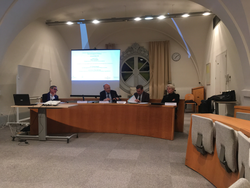March 3, 2018
Events : JoRC

Among all the things that were important to remember, one of the things that struck me most in the extraordinary conference of the President of the Court of Justice of the European Union Koen Lenaerts on "Europe of the Compliance "held on March 2, 2018 was his ability to make" live Europe ". Not only to make it understand but also to make it "live". Here is the challenge: that compliance is not an accumulation of processes without reason and without flesh, but a living whole taking its meaning into consideration of the human being, a person whose judge is concerned.
On 2 March 2018, Koen Lenaerts therefore came to an amphitheater at the University Panthéon-Assas (Paris 2) to inaugurate the series of conferences organized by the Journal of Regulation & Compliance (JoRC), a cycle that has the general title: Pour une Europe de la Compliance (For the Europe of Compliance). The School of Public Affairs of Sciences Po, the Department of Economics of Sciences Po, the Ecole doctorale de droit privé (Doctoral School of Private Law) at the Université Panthéon-Assas- Paris 2 (Panthéon-Assas University - Paris 2) and the School of Law of the University Panthéon-Sorbonne (Paris I), are associated with this cycle. Many personalities will take the floor.
Presented by Professor Thierry Bonneau, the conference made by President Koen Lenaerts was extremely rich and solid, perfectly constructed. Everyone had known the quality of the conference to be delivered by the President of the CJEU. The content of his demonstration will be found in the article he will give for the book that will be published in the Régulations & Compliance Series edited by Marie-Anne Frison-Roche at Éditions Dalloz. And the reader will find all the strength of this demonstration. This is necessary to venture into this area of "Compliance" : Koen Lenaerts recalled that we were still looking for the definition and a French term that would do justice to a satisfactory definition!footnote-90. This question was echoed by Antoine Garapon in his discussion.
Embodying the firmness that must be shown when words are uncertain, President Koen Lenaerts emphasized that the European Union is based on "Rule of Law". This means that the behaviors must respect Law. For that, - and that is why it is necessary to take in the literal sense the English expression "to comply with", the enterprise must not be passive but to make sure that its behavior is actually respectful of legal prescriptions. In this, there is a general paradigm shift, which inverses the relation betwenn the operator and the rules, from the Ex Post to the Ex Ante!footnote-89 as the entreprise has to be itself active to secure the effectiveness of the rule of Law. This internalization of the rule by the company develops both a procedural culture and a behavioral culture, in which companies can express an ethical dimension and build a "Trust Pact" !footnote-88 with states and public authorities. This change has been brought about by globalization, since states no longer have the means to impose ethical norms of behavior on businesses through the Ex Post intervention of their jurisdiction, but States like companies are gaining the benefit of this internalisation of rules in compagnies because the Compliance is inseparable from the accountability by which the company is compelled to justify that it actually tends to achieve the overall goals assigned by the public authority.
Thus, after exposing the general movement by which Europe opened up to this upheaval, President Koen Lenaerts took on three technical dimensions crossed by this new conception. The first is the Financial Markets Law. The second is Competition Law, about which the President has notably developed the Court's reflections on whether the adoption of a compliance program by an enterprise found to have violated Competition Law, in particular by "negligence" is neutral, or constitutes a mitigating circumstance or constitutes an aggravating circumstance. This question was taken up after the presentation in the discussion with the room. The third is that of personal data. Taking again as in a waltz with three times his remarks, the president of the Court of Justice found that the compliance, whereas it consists in transforming the Ex Post into Ex Ante becomes juridicalised and in this the Court of justice holds its not only in Europe but also in relation to the world, without however ever forgetting that it is the States that are drawing up the rules that are the foundation of Europe.
We will find in the article that will be published all these precious elements and no doubt that the elegance of the pen will be equal to that of speech.
But, written exercise requires, the reader will not find what we had the chance to attend: the story of two cases by the one I would prefer to name the "Professor Koen Lenaerts".
Two famous cases, which we teachers, comment and remind in our courses, that students learn and recite, quote in their copies. But never that way.
The first case is the Schrerms case, where the court said that Facebook could not transfer this person's personal data to the United States since he was opposed to it. To make it clear, the President revived it through the litigant, who was a student and for this reason he spoke directly to the students present in the amphitheater. He pointed out that the plaintiff at the origin of the case was a law student, like them. He detailed his situation in Austria, making some quotes in perfect German, pointing out that this student was now at the doctoral stage, inviting students to be brave, as he was. At each episode of the story, the speaker told the students, making some detours on his own student life because finally we were all in family ... Alma Mater. But his hands were telling the story even more: they were thrown themselves into the story, they brewed the space, it seemed as if they themselves were no more grandiloquent than the speaker but found their place exactly , in a magisterial position. Yes, here is a president in front of which companies have a hard time hiding the truth, a president with such firm hands and whose torso does not move but turns to the left and right to talk to everyone.
The second story was even more beautiful. The Google Spain case, I know it. I even know it by heart. I read it, commented on it, cited it a lot of times ... But all of a sudden that's what happened to a small Spanish merchant: President Koen Lenaerts told us his story, and I rediscovered the case. A small Spanish shopkeeper, whose name the speaker uttered in perfect Spanish, obtained from the Court of Justice that his "right to be forgotten" was recognized. President underlined the apparent paradox of his insistence for the appearance of his surname in the judgment by which this person had thus obtained the erasing of his surname! Yes, I did not notice ... Why did he ask for the mention of his name in the right to have his name deleted? Because it's a matter of honor. This is what the speaker insisted: do not joke with honor. And if you do, even Google will lose.
The merchant had been subject to a forced property sale procedure because of financial difficulty, which spanish newspapers had echoed. His honor was been trampled. Then, by a happy return of fortune, he had recovered his property, his prosperity, his reputation. But from that, the press had not talked about it. Some lines in a newspaper of legal announcements, but that it is nothing for the human soul. That's why he wanted these mechanical digital links to disappear, which always and for all end up with articles presenting him as a wretch without ever ending up with articles presenting him as a prosperous merchant (because of the non-existence of these second articles).
The speaker emphasized this dimension very much. And we know that the General Regulations that will come into force in May 2018 on personal data, which intrigues so much the Americans, draws in the judgment Google Spain its main solution in the matter: this "right to be forgotten" , subjective right so strange.
He emphasized this dimension very much. And we know that the General Regulations that will come into force in May 2018 on personal data, which intrigues so much the Americans, draws in the judgment Google Spain its main solution in the matter: this "right to be forgotten" , subjective right so strange.
Listening to President Koen Lenaerts, how not to think of Carbonnier? to his articles of it, especially on sociological rule : "small causes, great effects"?
From this conference, it will remain a great article, but as in the theater, where the ephemeral is part of the beauty of this art, what were these two stories, told by the one who knew how to listen when it was necessary to decide the two cases, stories told with the two firm hands that danced inviting students to enter this round, even as the President of the Court of Justice had to leave immediately to Luxembourg to hold such heavy obligations, yes it was simply beautiful .
Feb. 16, 2015
Bibliographic Reports : Books

Published by Oxford University Press (OUF), the collective book, Public Accountability, edited by Mark Bovens, Robert Goodin and Thomas Schillemann, consists of 43 contributions.
Few strictly focus on issues of regulatory matters. One can still quote the article by Colin Scott on Independent Regulators or those of Christie Hayne, Steven E. Salterio and Paul L. Posner and Shahan Asif on auditing (Accounting and Auditing; Audit Institutions).
The subject of most of the contributions is rather the necessary renewal of the management of the State, public governance incorporating this new way of "accountability," which explains the book title : itself: Public Accountability. But as we know that the line between public and private is more porous than ever, we can appreciate that the bookk extends its thoughts to the governance of private organizations or non-profit private sector by some contributions.
Indeed, the fact that Accountability is what is common to the Regulation and Governance. This is the first sentence of the book : "Accountability is the buzzword of modern governance".
Probably because of accountability has become a central concept, as shown in the introductory contribution, these are the articles that confront the most general elements such as "time" (Accountability and Time), "crisis" (Accountability for Crise) or "trust" (Accountability and trust), which are the most instructive for the future.
Thus, despite its collective character, the book is very consistent and often takes a critical tone about this invasion of public space by the will of accoutability, the authors emphasizing the "deficits", the failures and especially thet prohibitively expensive of this mechanism.
It would come to regret the simple mechanism of hierarchical rule to which a nostalgic contribution is devoted, which describes how operated the State before we apply to it the State the agency theory.
So it is a practical book, complete, critical and prospective, of great interest.
Updated: Sept. 3, 2012 (Initial publication: Aug. 26, 2012)
Breaking news

Updated: June 4, 2012 (Initial publication: June 4, 2012)
Contributions

Updated: Jan. 31, 2012 (Initial publication: Jan. 13, 2012)
Contributions
Bibliographical Report (Book) : Global Financial Integration, Thirty Years on. From reform to crisis

Updated: Jan. 17, 2012 (Initial publication: Jan. 13, 2012)
Bibliographic Reports : Books

Translated summaries
The translated summaries are done by the Editors and not by the Authors
ENGLISH
The purpose of this collective work is to understand the causes of the financial crisis. It has a strong international dimension and draws in both legal and economic science. Although composed of independent contributions from each other, it relies on a general demonstration, summary of which will largely be the focus of this first bibliographic report, the importance of justifying the work that results in three successive bibliographic reports. Furthermore, the book focuses on the specific issue of governance in international finance, which runs through regulatory issues, but one cannot be reduced to the other and vice versa.
Therefore in all three bibliographic records, abstracts will be more or less developed on the contributions, depending on whether they directly concerned by regulation, in which case they will be preferred or more remote areas, in which case they will shortly exposed.
The first bibliographic record aims to present, on the one hand, the general problem of the book, and also to highlight two contributions of historical (1920-1930/2001-2007).
FRENCH
Fiche Bibliographique (Livre) : La globalisation de l’intégration financière. Perspective de trente ans, de la réforme à la crise)
Cet ouvrage collectif a pour objet de comprendre les causes de la crise financière. Il présente une dimension fortement internationale et puise à la fois dans la science juridique et économique. Bien que constitué de contributions autonomes les unes des autres, il s’appuie sur une démonstration générale, dont le résumé sera en grande partie l’objet de cette première fiche bibliographique, l’importance de l’ouvrage justifiant qu’il donne lieu à a trois fiches bibliographiques successives. En outre, l’ouvrage porte sur la question précise de la gouvernance dans la finance internationale, ce qui traverse les questions de régulation mais l’un ne se réduit à l’autre et vice et versa.
C’est pourquoi dans chacune des trois fiches bibliographiques, des résumés seront plus au moins développés concernant des contributions, suivant que celles-ci abordent directement des thèmes de régulation, auquel cas elles seront privilégiées, ou des thèmes plus éloignés, auquel cas elles ne seront qu’évoquées.
Cette première fiche bibliographique a pour objet de présenter d’une part la problématique générale de l’ouvrage et d’autre part de mettre en valeur deux contributions, de nature historique (1920-1930/2001-2007).
SPANISH
Informe Bibliográfico (Libro): La Integración Global Financiera, perspectivas desde 30 años. De la reforma hasta la crisis.
El objetivo de este trabajo colectivo es de entender las causas de la crisis financiera. Contiene una gran dimensión internacional y se apoya tanto en las ciencias legales como en las económicas. Aunque es una colección de contribuciones independientes el uno del otro, todos tienen en común una dimensión general, lo cual será detallado en el primer informe bibliográfico, la importancia de justificar el trabajo que resulta en tres informes bibliográficos sucesivos. El libro se centra en el tema específico de la gobernabilidad en la finanza internacional, la cual se relaciona a la regulación, pero uno no se reduce al otro y viceversa.
Por lo tanto, en cada uno de los tres informes bibliográficos, abstractos serán desarrollados para cada contribución, dependiendo de su relatividad a la regulación, en dado caso se les dará preferencia sobre casos mas lejanos, los cuales serán brevemente mencionados.
El primer informe bibliográfico se propone a presentar, de un lado, el problema general del libro, y del otro, de subrayar dos contribuciones históricas (1920-1930/2001-2007).
ITALIAN
Lo scopo di questo lavoro collettivo è capire le cause della crisi finanziaria. Tale lavoro ha una forte dimensione internazionale e si posiziona in un contesto legale ed economico. Sebbene composto da contributori indipendenti l’un dall’altro, si fonda su una problematica generale, il cui riassunto sarà l’oggetto principale di questa prima relazione bibliografica. L’importanza di tale studio è tale da giustificare i tre articoli che seguiranno su tale lavoro. Inoltre, questo lavoro di ricerca si focalizza sul tema specifico della governance in materia di finanza internazionale, e tocca diversi temi relativi alla regolazione che non possono essere ridotti o confusi l’un con l’altro. Pertanto, per tutti e tre questi articoli bibliografici, gli abstract saranno più o meno approfonditi su tali contribuzioni, a seconda del fatto che tale contribuzione sia rilevante ai fini dell’analisi della regolazione, nel qual caso l’abstract sarà più consistente, o se la contribuzione tocchi solo incidentalmente la regolazione, nel qual caso gli abstract saranno più corti.
La prima relazione bibliografica punta, da un lato, a presentare la problematica generale di tale lavoro e, dall’altro, ad attirare l’attenzione su due contribuzioni, di natura storica.
.....................
Other translations forthcoming.
Updated: Jan. 16, 2012 (Initial publication: Oct. 12, 2011)
Translated Summaries

Updated: Jan. 4, 2012 (Initial publication: July 1, 2011)
Contributions

Updated: Jan. 4, 2012 (Initial publication: May 28, 2011)
Releases : I. Isolated Articles
Translated Summaries
ENGLISH
Two and a half years after having been established by the LME, the French Competition Authority has uncontestably acquired its “place in the sun” amongst the competition authorities of other countries, as demonstrated by multiple indicators.
ITALIAN
Articolo: L’Autorità garante della concorrenza tra “regolazione” e politica in materia di concorrenza
Due anni e mezzo dopo l’instaurazione da parte del LME, l’Autorità francese garante della libera concorrenza ha trovato il suo posto tra le diverse autorità degli altri paesi, così come è stato dimostrato da diversi indicatori.
SPANISH
Artículo: La Autoridad de la competencia, entre “regulación” y política competitiva.
Después de dos años y medio de haber sido establecido por el LME, la Autoridad francesa de la competencia ha incontestablemente adquirido su “lugar bajo el sol” entre las autoridades de la competencia de otros países, como demostrado por varios indicadores.
.....................
Other translations forthcoming.
Updated: Dec. 21, 2011 (Initial publication: Nov. 17, 2011)
Contributions

Updated: Dec. 13, 2011 (Initial publication: Oct. 18, 2011)
Contributions

Updated: Dec. 6, 2011 (Initial publication: Oct. 12, 2011)
Bibliographic Reports : Books

Translated Summaries
In The Journal of Regulation the summaries’ translation are done by the Editors and not by the authors
ENGLISH
Bibliographic Report (Book): The regulation of industrial networks, what evolutions and perspectives in France and in Europe? by Fondation Nationale Entreprise et Performance
Full citation: Fondation nationale Entreprise et Performance, La régulation des réseaux industriels. Quelles évolutions et perspectives en France et en Europe?, Preface Hagelsteen, Marie-Dominique, 105 p., La documentation Française, 2011.
Report by Marie-Anne Frison-RocheManaging Editor and Director
This report ambits to improve the regulation of industrial networks in France and in Europe. Therefore, the Fondation nationale Entreprise et Performance (FNEP) concentrates its study on industrial networks, a category in which it includes telecommunications, energy, rail transportation, and postal services, in France and in Europe. The report proposes new rules or adaptations to old ones in order to increase regulators’ independence, efficacy, and oversight. It then suggests rules be modified to allow for the implementation of regulation at the European level, whenever the relevant market is European in scale.
FRENCH
Compte-rendu bibliographique (Livre): La régulation des réseaux industriels. Quelles évolutions et perspectives en France et en Europe ? par Fondation Nationale Entreprise et Performance.
Compte-rendu faite par Marie-Anne Frison-Roche
Ce rapport ambitieux vise à améliorer la régulation des réseaux industriels en France et en Europe. Par conséquent, la Fondation nationale Entreprise et Performance (FNEP) concentre son étude sur les réseaux industriels, une catégorie dans laquelle le rapport inclut les télécommunications, l’énergie, le transport ferroviaire, et les services postaux, en France et en Europe. Le rapport propose de nouvelles règles ou des adaptations de précédentes, afin d’accroître l’indépendance des régulateurs , d’augmenter l’efficacité et la surveillance. Il propose ensuite que des règles soient modifiées pour permettre la mise en œuvre de la régulation au niveau européen, chaque fois que le marché pertinent est de dimension européenne.
ITALIAN
Relazione bibliografica (Libri): III-1.9: La regolazione delle reti industriali. Quali sono le evoluzioni e le prospettive in Francia e in Europa? A cura della Fondation Nationale Entreprise et Performance
Questa relazione punta a migliorare la regolazione delle reti industriali in Francia e in Europa. Tuttavia la “Fondation Nationale Entreprise et Performance” (FNEP) focalizza la sua attenzione sulle reti industriali, una categoria che include le telecomunicazioni, l’energia, il trasporto ferroviario ed i servizi postali, in Francia ed in Europa. La relazione propone delle nuove regole o una modifica delle regole esistenti per aumentare l’indipendenza, l’efficacia e la vigilanza delle autorità di regolazione. Inoltre, propone di modificare alcune norme per permettere l’applicazione della regolazione al livello europeo, ogni volta che il mercato rilevante è quello europeo.
.....................
Other translations forthcoming.
Updated: Sept. 7, 2011 (Initial publication: Sept. 1, 2011)
Contributions

Updated: July 19, 2011 (Initial publication: July 1, 2011)
Bibliographic Reports : Books

